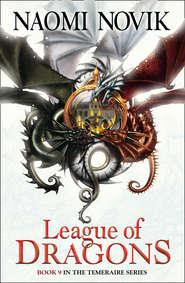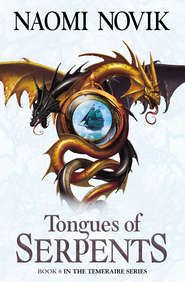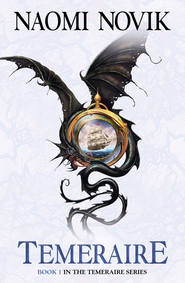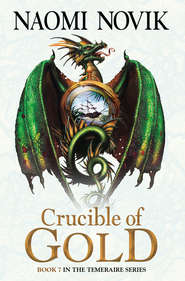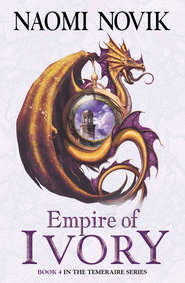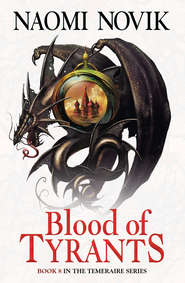По всем вопросам обращайтесь на: info@litportal.ru
(©) 2003-2024.
✖
Black Powder War
Автор
Год написания книги
2019
Настройки чтения
Размер шрифта
Высота строк
Поля
To his relief, in the waning light the horsemen broke camp and left; their passage away could be followed by the dust which they kicked up, lingering like a mist against the deepening twilight. At last Laurence went himself to the sardoba and knelt by the edge to cup the cold water directly to his mouth: fresh and more pure than any he had tasted in the desert, only a faint earthen taste from lying sheltered inside the clay brick. He put his wet hands to his face and the back of his neck, coming away stained yellow and brown with the dust which had collected upon his skin, and drank another few handfuls, glad of every drop, before he rose again to oversee their making camp.
The water-casks were brimming again and heavy, which displeased only the camels, and even they were not unhappy; they did not spit and kick while being unloaded, as was their usual practice, but submitted quietly to the handling and to their tethers, and eagerly bent their heads to the tender green shrubs around the water-hole. The men’s spirits all were high, the younger boys even playing a little in the cool evening at a makeshift bit of sport with a dead branch as bat and a rolled-up pair of stockings for a ball. Laurence felt certain that some of the flasks being passed from hand to hand held something considerably stronger than water, though he had ordered all liquor poured out and replaced with water before they entered the desert; and they made a merry dinner, the dried meat far more palatable for having being stewed with grain and some wild onions growing near the water’s edge, which Gong Su had pointed out to them as fit for human consumption.
Tharkay took his portion and planted his small tent a little way off, speaking in low voice only to the eagle, resting hooded and silent on his hand after its own meal of a couple of plump and unwary rats. The isolation was not wholly self-imposed: Laurence had not spoken of his suspicions to the men, but his anger that morning at Tharkay’s disappearance had transmitted itself without words, and in any case no-one thought much of his having gone off in such a manner. At worst he might have meant to strand them deliberately: certainly none of them would have been able to find the oasis alone, without the trail accidentally provided by the horsemen; or only a little less bad, he might instead have chosen to abandon them to an uncertain fate, and to secure his own safety by taking a camel and water enough to last him a long time alone. He might have returned to them, having discovered the oasis, but that he had left them only to scout ahead, Laurence could not credit: without a word? With no companion? If not entirely disprovable, still unsatisfying.
What was to be done about him an equal puzzle: they could not manage without a guide, though Laurence could not see continuing with one untrustworthy; yet how another was to be found, he could not well conceive. At least any decision by necessity would be deferred to Yutien: he would not abandon the man alone in the desert, even if Tharkay had meant to do as much to them; at least not with so little proof. So Tharkay was left to sit alone untroubled for the moment, but as the men began to seek their beds, Laurence quietly arranged with Granby a doubled guard on the camels, and let the men think it was only for fear of the horsemen returning.
The mosquitoes sang loudly, all around them, after the sun had gone down; even hands pressed over the ears could not drown out their thin whining voices. The first sudden howling was at first almost a relief, a clear reasonable human noise; then the camels were bellowing and plunging as the horses came stampeding through the middle of the camp, their riders yelling loud enough to drown out any orders Laurence might shout, and scattering the embers of the campfire with long raking branches dragged along the ground.
Temeraire sat up from behind the tents and roared: the camels began struggling all the more wildly against their hobbles, and many of the ponies whinnying in terror bolted away; Laurence heard pistols going off in all directions, and the white muzzle-flashes painfully bright in the dark. ‘Damn you; don’t waste your shot,’ he bellowed, and seized young Allen, pale and frightened, as he stumbled backwards out of a tent with a pistol shaking in his hand. ‘Put that down, if you cannot—’ Laurence said, and caught the pistol as it fell; the boy was sliding limp to the ground, blood spurting from a neat pistol-hole in his shoulder.
‘Keynes!’ Laurence shouted, and thrust the fainting boy into the dragon-surgeon’s arms; he drew his own sword and dashed towards the camels, the guards all staggering uselessly up to their feet, with the thick confused look of men woken from drunken slumber, a couple of hip-flasks rattling empty on the ground beside them. Digby was clinging to the animals’ tethers, nearly dangling by them to keep the camels from rearing: the only one being of any use, even though his gangly young frame was hardly enough weight to keep their heads down, and he was nearly bouncing at the ends of the reins with his fair hair, grown long and unkempt, flopping wildly.
One of the raiders, thrown from his fear-maddened horse, gained his feet; if he could get at the tethers and cut them, the unleashed camels would do half the work, for they would surely bolt directly out of the camp in their present state of confusion and terror; on horseback the raiders could then herd them together and away, and vanish among the hills and valleys of the surrounding dunes.
Salyer, one of the midshipmen on watch, was fumbling his pistol one-handed, trying to cock the hammer and rub at his gummy eyes with the other, while the man bore down on him with sabre raised; suddenly Tharkay was there, snatching the pistol from Salyer’s slack grip. He fired into the raider’s chest, dropping him to the ground, and drew in his other hand a long knife; another of the raiders swung at his head, from on horseback, and Tharkay ducking underneath coolly slit open the animal’s belly. It fell screaming and thrashing, the man pinned underneath and howling almost as loudly, and Laurence’s naked sword swept down once, twice, and silenced them both.
‘Laurence, Laurence, here!’ Temeraire called, and lunged in the dark towards one of the supply tents, the red scattered remnants of the fire giving off a little light, enough to see shadows moving around the edges, and the silhouettes of rearing, snorting horses. Temeraire struck with his talons, fabric ripping as the tent collapsed around the body of a man, and all the other horsemen were suddenly going, drumming hooves going quiet and muffled as they fled from the hard-packed campground onto loose sand, leaving only the mosquitoes behind to raise up their song again.
They had accounted for five men and two horses all told; their losses one of the midwingmen, Macdonaugh, who had taken a sabre-thrust to the belly and now lay gasping quietly upon a makeshift cot; and young Allen: his tent-mate Harley, who had fired off the shot in panic as the horses went thundering by, wept quietly in a corner, until Keynes in his brusque way told the boy, ‘Cease to behave like a watering-pot, if you please; you had better practice your aim: a shot like that would not kill anyone,’ and set him to cutting up bandages for his fellow ensign.
‘Macdonaugh is a strong fellow,’ Keynes said to Laurence quietly, ‘but I will not give you false hope,’ and a few hours before morning, he gave a choked rattling sigh and died. Temeraire dug him a grave in the dry earth some little distance from the watering pool, in the shade of the poplars; very deep, so that sandstorms would not expose the body. The bodies of the other men they buried more shallowly, in a mass grave. The raiders had carried off very little in exchange for their blood: a few cooking pots, a bag of grain, some blankets; and one of the tents had been ruined by Temeraire’s attack.
‘I doubt they will make another attempt, but we had better move on as quickly as we can,’ Tharkay said. ‘If they choose to carry a false report of us back to Khotan, we might find an unpleasant welcome there.’
Laurence did not know what to make of Tharkay: if he were the most brazen traitor alive, or the most inconsistent; or his own suspicions wholly unjust. That had been no coward standing up beside him during the fight, with the panicked animals on every side and the attackers intent only on gain: easy enough for Tharkay to duck away quietly, or even to let the bandits have their way and snatch a camel for himself in the confusion. Still, a man might be brave enough with swords drawn and that say nothing for his character otherwise; though Laurence felt awkward and ungrateful for entertaining the thought.
He would not take further chances, however, at least none unnecessary: if four days’ time brought them safely to Yutien, as Tharkay had promised, well and good; but Laurence would not put them in a position to starve if the promise did not hold true. Fortunately, having gorged himself on the two dead horses, Temeraire was able now without pain to leave the remaining camels unmolested for a couple of days: and at evening on the third he took Laurence aloft, and in the distance they saw the narrow ribbon of the Keriya River shining silver-white in the sunset, interrupting the desert and garlanded with a swath of thick and verdant green.
Temeraire ate his camel that night with pleasure, and they all drank their fill; the next morning they soon came to farmland, bordered on all sides by tall swaying stands of cannabis plants growing higher than a man’s head, planted in perfectly squared rows to anchor the dunes; and vast groves of mulberry trees, leaves rustling against one another in the whisper of breeze, on the approach to the great desert city.
The marketplace was divided into separate quarters, one full of gaily painted wagons that were both transport and shop, drawn by mules or the small shaggy ponies, many of them adorned also with waving collared plumes; in the other, tents of breezy cotton were set up on frameworks of poplar branches to provide a kind of storefront, and smallish dragons in bright spangly jewellery curled around them in company with the traders, raising their heads curiously to watch Temeraire go by; he eyed them with equal interest, and some covetous gleam. ‘It is only tin and glass,’ Laurence said hurriedly, hoping to forestall any desire Temeraire might have to deck himself out in similar wise. ‘It is not worth anything.’
‘Oh; it is very pretty, though,’ Temeraire said regretfully, lingering on a dramatic ensemble rather like a tiara of purple and crimson and brass, with long swooping chains of glass beads draped down the neck.
Like the horsemen they had met, the faces were more Turkish than Oriental, nut-brown in the desert sun, but for the heavily veiled Mahommedan women of whom only their hands and feet could be seen; other women did not cover their faces, but wore only the same four-cornered caps as the men, embroidered lavishly in dyed silks, and watched them with open curious dark eyes: interest returned in at least full measure by the men. Laurence turned to give Dunne and Hackley, the rather exuberant young riflemen, a hard look: they started guiltily and dropped their hands, which they had raised to kiss to a pair of young women across the road.
Trade goods were laid out in every corner of the bazaar: sturdy sacks of cotton canvas standing upon the ground full of grains and rare spices and dried fruit; bolts of silks in queer many-collared patterns of no meaning, neither flowers nor any other image; gleaming treasure-vault walls of stacked chests, with strips of brass hammered on like gilding; bright copper jugs hanging and white conical jars half-buried in the ground, for keeping water cool; and notably many wooden stands displaying an impressive array of knives, their hilts cunningly worked, some inlaid and jewelled, and the blades long and curving and wicked.
They went at first warily through the streets of the bazaar, keeping their eyes on the shadows, but their fears of another ambush proved unfounded: the natives only smiled and beckoned from the stalls, even the dragons themselves calling out invitations to come and buy, some in lovely clear fluting song which Temeraire paused now and again to try and answer with snatches of the dragon language that Tharkay had begun to teach him. Here and there a merchant of Chinese ancestry came out of his stall and bowed low to the ground as Temeraire went by, in respect, and stared in puzzlement at the rest of them.
Tharkay led them unerringly through the dragon quarter and skirting a mosque beautifully painted, the square before it presently full of men and even a handful of dragons prostrating themselves on soft woven prayer-rugs; on the outskirts of the market they came to a comfortable pavilion large enough to accommodate even Temeraire, tall slim wooden columns holding up a roof of canvas, with poplar trees shading the square all around. A little of Laurence’s dwindling supply of silver bought them sheep for Temeraire’s dinner, and a rich pilaf of mutton and onion and moist sweet sultanas for their own, with flat rounds of roasted bread and juicy water-melons to eat in thick slices down to the pale green rind.
‘Tomorrow we can sell the rest of the camels,’ Tharkay said, after the scant leavings had been carried away and the men had disposed themselves around the pavilion, to drowse upon comfortable rugs and cushions; he was feeding the eagle on scraps of sheep’s liver, discarded by Gong Su from the preparations for Temeraire’s meal. ‘From here to Kashgar the oases are not so far apart, and we need only carry enough water for a day.’
No news could have been more welcome; comfortable again in body and spirit, and greatly relieved by their safe crossing, Laurence was inclined to make allowances. To find another guide would take time, and the poplar trees murmuring together around the clearing said that time was short: their leaves had begun to turn gold, early heralds of autumn. ‘Walk with me a moment,’ he said to Tharkay, when the guide had settled the eagle back into its cage and draped it for the night; together they went a little distance back into the lanes of the marketplace, the tradesmen beginning to pack their things away, rolling up the lips of the sacks to cover their dry goods.
The street was busy and crowded, but English was enough privacy; Laurence stopped in the nearest shade and turned to Tharkay, whose face was all polite untroubled inquiry. ‘I hope you have some notion already what I wish to say to you,’ Laurence began.
‘I am sorry it is not so, Captain, and I must put you to the trouble of explication,’ Tharkay said. ‘But perhaps that is best: misunderstandings shall be thus avoided; and I am sure I know of no reason why you should scruple to be frank with me.’
Laurence paused; this sounded to him again more sly half-mockery, for Tharkay was no fool, and he had not spent four days nearly shunned by all their company without noticing. ‘Then I will oblige you,’ Laurence said, more sharply. ‘You have brought us so far successfully, and I am not ungrateful for your efforts; but I am very heartily displeased with your conduct in having abandoned us unannounced in the midst of the desert.
‘I do not want excuses,’ he added, seeing Tharkay’s brow lift. ‘I count them useless, when I cannot know whether to believe them. But I will have your promise that you will not again leave our camp without permission: I want no more of these unannounced departures.’
‘Well, I am sorry not to have given satisfaction,’ Tharkay said thoughtfully, after a moment. ‘And I would never wish to keep you to what now seems to you a bad bargain, out of some sense of obligation. I am perfectly willing we should part ways here if you like. You will be able to find a local guide, in a week or two, perhaps three; but I am sure that cannot mean very much: you will certainly still arrive home in Britain quicker than the Allegiance should have brought you there.’
This answer neatly evaded the required promise, and brought Laurence up directly: they could not easily give up three weeks or one; if that were not an optimistic estimate to begin with, as they knew neither the local language, which seemed closer to Turkish than Chinese, nor the customs: Laurence was not even sure they were still in territory claimed by China, or in some smaller principality.
He swallowed anger, renewed suspicion, and a hasty reply, though all three stuck unpleasantly in his throat. ‘No,’ he said, grimly. ‘We have no time to waste; as I think you know very well,’ he added: Tharkay’s tone had been bland, unreadable, but a little too much so; and there was something knowing in his look, as though he understood their special urgency. Laurence still had the letter from Admiral Lenton secure in his baggage, but now he recalled the smudged softness of the red wax seal, when the letter had first been given him: easy enough, bringing the letter across all these miles, to have pried it open and then sealed it up again.
But Tharkay’s expression did not change at the hint of accusation; he only bowed and said mildly, ‘As you wish,’ and turning went back to the pavilion.
Chapter Four (#ulink_cc9c6808-9d8a-53ff-8037-be6085d19cba)
The red dry mountains looked as though they had been folded directly up out of the desert plain, cliffs painted with broad stripes of white and ochre, without any softening foothills at their base. They remained stubbornly distant: for a whole day Temeraire flew at a steady pace and seemed to come no closer, the mountains drawing themselves ever upwards and out of reach, until suddenly canyon walls were rising to either side. In the space of ten minutes’ flight the sky and desert vanished away behind them, and abruptly Laurence understood the red mountains themselves were the foothills for the towering white-clad peaks beyond.
They camped in wide meadowlands high in the mountains, fortressed by the peaks and sparsely furred with sea-green grass, small yellow flowers standing up like flags from the dusty ground. Horned black cattle with bright red tassels dangling over their foreheads eyed them warily as Tharkay negotiated their price with the herdsmen in their round and conical-roofed huts. At night a few white flakes came silently drifting down, glittering against the night; they melted snow in a great leather pot for Temeraire to drink.
Occasionally, they heard a faint, far-off call of dragons that made Temeraire prick up his ruff; and once in the distance saw a feral pair go spiralling up chasing each other’s tails, crying out in shrill joyful voices before they vanished around the other side of a mountain. Tharkay made them put veils over their eyes, to shield against the brilliant glare; even Temeraire had to submit to this treatment, and very odd he looked with the thin white silk wrapped around his head like a blindfold. Even with such precautions, their faces grew pink and sunburnt for the first few days.
‘We will need to take food with us, past Irkeshtam,’ Tharkay said, and when they had made camp outside the old rundown fortress, he went away and returned nearly an hour later with three locals herding along a small band of fat, short-legged pigs.
‘You mean to take them up alive?’ Granby cried, staring. ‘They will squeal themselves hoarse and then die of terror.’
But the pigs seemed curiously somnolent and indifferent to Temeraire’s presence, much to his puzzlement: he even leaned over and nudged at one with his nose, and it only yawned and sat down thump on its hindquarters in the snow. One of the others kept attempting to walk into the brick wall of the fortress, and had to be hauled repeatedly back by its minders. ‘I put opium in their feed,’ Tharkay said, in answer to Laurence’s confusion. ‘We will let the drug wear off when we make camp, and he will eat after we have rested; then the rest we dose again.’
Laurence was wary of this notion, and not inclined to trust Tharkay’s offhand assurance; he watched closely after Temeraire ate the first pig. It went to its death perfectly sober and kicking all the way, and Temeraire showed no inclination afterwards to begin flying in mad circles; although he did fall into rather a deeper sleep than usual, and snored loud enough to rattle.
The pass itself climbed so high they left the clouds below them, and all the rest of the earth; only the nearby mountain peaks kept them company. Temeraire panted for breath, now and again, and had to let himself down to rest wherever the ground permitted, leaving his body outlined in the snow as he lifted away. There was a queer sense of watchfulness, all the day long; Temeraire kept looking around as he flew, and pausing to hover in mid-air, with a low uneasy rumbling.
Having cleared the pass, they set down for the evening in a small valley sheltered from the wind between two great peaks with the ground clear of snow, and anchored their tents at the bottom of the cliff face; the pigs they penned up with a fence of kindling and rope, and let them range freely. Temeraire paced his side of the valley a few times, and then settled himself down with his tail still twitching; Laurence came to sit beside him with his tea. ‘It is not that I hear anything,’ Temeraire said, uncertainly, ‘but I feel as though I ought to be hearing something.’
‘We have a good position here: we cannot be come upon by surprise, at least,’ Laurence said. ‘Do not let it keep you from sleeping: we have posted a watch.’
‘We are very high in the mountains,’ Tharkay said unexpectedly, startling Laurence: he had not heard the guide come towards them. ‘You may only be feeling the change, and the difficulty of breathing: the air has less body.’
‘Is that why it is so hard to breathe?’ Temeraire said, and abruptly sat up on his haunches; the pigs began to squeal and run as nearly a dozen dragons, motley in colours and size, came winging down towards them. Most of them landed skilfully clinging to the cliff face, peering down towards the tents, faces sleek and clever and hungry looking; the largest three dropped down between Temeraire and the makeshift pen, and sat up on their haunches, challengingly.
They were none of them large: the lead fellow something smaller than a Yellow Reaper, pale grey with brown markings and a single crimson patch across half his face and down his neck, with a great many spiny horns around his head; he bared his teeth and hissed, the horns bristling. His two companions were of slightly larger size, one a collection of bright blues and the other dark grey; and all three heavily scarred with the relics of a great many battles, the marks of tooth and claw.
Temeraire outweighed nearly all three of them together: he sat up very straight and his ruff opened wide, stretching like a frill around his head, and gave a small growling roar in answer: a warning. The ferals, so isolated from all the world, likely would not know to fear Celestials as anything other than large dragons, for their size and strength; but the strange ability of the divine wind was by far their most dangerous weapon, and without visible means could shatter stone and wood and bone. Temeraire did not now raise the divine wind against them, but there was an edge of it in his roaring, enough to rattle Laurence’s bones; and before it, the ferals quailed, the red-patched leader’s horns flattening against his neck, and like a flock of alarmed birds they all flung themselves up and out of the valley.
‘Oh; but I did not do anything, yet,’ Temeraire said, puzzled and a little disappointed. Above them the mountains were still grumbling with the echoes of his roar, piling them one on another into a continuous roll of thunder, a sound almost magnified beyond the original. The white face of the peak stirred at the noise, sighed, and let go its hold upon the stone, the entire slab of snow and ice sliding free almost gently; for a moment yet it kept its shape, moving with slow and stately grace, then cracks like spiderwebs spread across its surface, and the whole collapsed into a great billowing cloud and came galloping down the slope towards the camp.
Laurence felt like the captain of a ship on her beam-ends, seeing the wave that would make her broach-to: in perfect consciousness of disaster and powerless to avert it; there was no time to do anything at all but watch. So quickly did the avalanche come that a couple of the luckless ferals, though they had all tried at once to flee, were swept up in its path. Tharkay was shouting, ‘Get away! Get away from the cliff!’ to the men standing around the tents, pitched directly in the path; but even as he cried out, the vast eruption spilled off the slope, swept over the camp, and then the boiling mass came seething and roaring across the green valley floor.
First there came a shock of cold air, almost physical in its force; Laurence was flung back against Temeraire’s great bulk, reaching out to catch Tharkay’s arm as the guide too stumbled back, and then the cloud itself struck and tore away the world: like being thrust abruptly face-forward into deep snow and held down, a cool muffling eerie blue all around him, a hollow rushing sound in his ears. Laurence opened his mouth for air that was not there, flakes and slivers of ice like knives scraping his face, his lungs heaving against the pressure on his chest, on his limbs, his arms spread-eagled and pressed back so that his shoulders ached.






